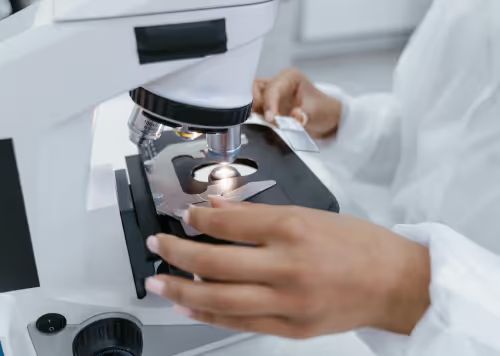How biological age tests work (and what they really show)
Biological age is your body's age at a cellular and physiological level.


Key takeaways
- Biological age tests estimate how old your body is on a cellular level, providing a more accurate picture of your overall health than your chronological age.
- These tests use different methods, such as DNA methylation, telomere length, and metabolic biomarkers, to highlight how lifestyle, genetics, and environment impact ageing.
- While not diagnostic, biological age results can help identify early signs of metabolic stress and guide personalised lifestyle changes to improve long-term health and longevity.
We all know our chronological age—the number of birthdays we've had. But have you ever wondered if that number tells the full story of how your body is ageing?
Well, chances are that it doesn't, and that's exactly where biological age tests come in.
These assessments look at your body’s health at a cellular level and analyse how your lifestyle, genetics, and environment are influencing your ageing process.
Read as we break down how biological age tests work, what they reveal, and how you can use them to make small but meaningful changes for better long-term health.
What is a biological age test?
A biological age test is a health assessment that estimates how old your body really is on the inside, based on biomarkers such as inflammation levels and metabolic function.
Your biological age results are a reflection of cellular wear and tear. This can come from natural ageing, or other factors like your genetics, lifestyle habits, and environmental exposure.
Why does your biological age matter?
Your biological age reflects your overall health, regardless of how many years you've been alive. It's important because it can guide health and lifestyle changes by:
- Predicting health outcomes more accurately than chronological age
- Flagging areas of your health that are ageing faster, like cardiovascular health or metabolic function
- Spotting risk factors for chronic conditions like type 2 diabetes, heart disease, and cognitive decline
- Identifying opportunities to improve your lifestyle, whether that's through diet, exercise, sleep, or stress management, and ultimately support healthier ageing
How is biological age different from chronological age?
Biological age is your body's age at a cellular and physiological level, whereas chronological age is simply the number of years you've been alive [1].
Two people with the same chronological age can have very different biological ages. For example, someone who struggles with sleep, smokes, and has a high body mass index may be 50 years old but have a true biological age of 55.
Someone else, also 50, may have years of regular exercise, eating nutrient-rich meals, and prioritising sleep, giving them a lower biological age of 45.
How is biological age calculated?
There are a few different ways of calculating biological age, each offering a different lens on how your body is ageing [2]. These include:
- DNA methylation tests use a blood sample to look at DNA changes and give insights into ageing at a molecular level. They're considered the gold-standard approach for biological age testing, providing the most accurate results. You can get them done at a pathology centre or with an at-home finger-prick kit.
- Telomere length tests look at a blood or saliva sample to measure the average length of your telomeres—that is, the protective end-caps of your chromosomes that shorten as cells divide. In a nutshell, shorter telomeres can indicate cellular ageing and increased risk of age-related conditions.
- Physical and functional assessments, such as grip strength, VO₂ max, and flexibility tests, can gauge how well your body performs in key physical and functional areas. Results are less precise at a molecular level, but can provide actionable insights for strength, mobility, and overall lifestyle improvements.
- Lifestyle questionnaire and wearable data can also be used in tandem to estimate biological age, through algorithms that analyse patterns in your sleep, activity, heart rate, and daily habits. It's a non-invasive, convenient method, but once again, not as precise as lab-based alternatives.
Whichever method you go for, your results are compared against population data to reveal whether your body is ageing faster or slower than your actual age.
What are biological age tests designed to show you?
Biological age tests don't just give you a number. You'll typically get a report or digital dashboard that breaks down your results into a few key sections.
The exact structure of this report will vary depending on the provider and type of test you choose, but generally, it includes:
- The headline result: Your biological age vs your actual age.
- Age-related biomarkers: These include DNA methylation patterns, inflammation markers, glucose and lipid levels, gut health, and metabolic function, which are all marked as younger than, on par with, or older than your chronological age.
- System overviews: A snapshot of several body systems marked as optimal, moderate, or needs attention. This usually covers cardiovascular health, metabolic health, cognitive function, cellular resilience, and immune system performance.
- Lifestyle changes: Most reports end with personalised recommendations on how to improve your biological age, with a focus on sleep, nutrition, physical activity, and stress management.
How does biological age relate to metabolic health?
Metabolic health is one of the core factors in biological age testing. This is because your metabolism plays a key role in how quickly (or slowly) your body ages.
Your metabolic health refers to processes like blood sugar control, blood pressure, and body composition—all of which shape your cellular function and longevity.
Here are the many ways they tie together:
- Stable blood sugar helps slow down ageing. The opposite—chronically high blood sugar and insulin resistance—speeds up cell damage and inflammation.
- Healthy blood pressure improves circulation and cell repair. When your heart is working properly, more oxygen and nutrients flow into your tissues, helping your cells regenerate more effectively.
- A balanced metabolism means your body uses energy more efficiently. This supports your mitochondrial function (in plain English, how well your cells produce and use energy) to maintain vitality and potentially slow down biological ageing.
- Inflammation and oxidative stress are two big ageing accelerators. Poor metabolic health causes oxidative stress, which can damage DNA, a key marker of biological age tests.
Can biological age be improved?
Definitely! Your biological age isn't fixed—it can change. If you think about it, that's the main benefit of biological age testing: it helps you understand how your lifestyle choices are affecting your body's ageing, and where you can make changes.
A few key areas you can focus on include:
Improve your eating habits
Follow a diet rich in whole foods, lean protein, plenty of fruit and veg, and healthy fats like olive oil and avocado. Make sure to incorporate antioxidant-rich foods as well, as they support healthy cell repair.
As for what to cut out, ultra-processed foods, added sugar, and excess alcohol all contribute to oxidative stress and accelerated ageing.
And don't forget hydration. Drinking enough water every day helps keep digestion and circulation in check, so all essential nutrients can reach your cells.
Exercise regularly
Movement is one of the most powerful tools for anti-ageing. Combining resistance training, cardio, and flexibility exercises helps keep your weight in a healthy range, build and maintain muscle mass, stabilise blood pressure, and support heart health.
Even daily incidental exercise—things like taking the stairs instead of the elevator or walking to the local shops instead of driving—adds up over time.
Prioritise sleep
Your body does its most important repair work while you're snoozing away, which is why it's crucial to get 7-9 hours of quality sleep per night.
If you struggle with sleep, try going to bed around the same time every night, keeping your room cool, and limiting screen time and caffeine before bedtime.
Manage stress levels
Chronic stress increases cortisol and inflammation and, as a result, can speed up your biological age. If you constantly feel on edge, try to incorporate stress management strategies into your routine.
Different approaches will work for different people, but a few to consider include journaling, spending time outdoors, doing yoga, meditating, or even doing high-intensity activities like running or boxing.
Keep your mind active
Just like you exercise your body, you need to exercise your brain to keep cognitive function sharp. Simple activities like reading, solving puzzles, or picking up a new hobby can all help keep your mind engaged and your biological age low.
How biological age tests are used in preventative health
Biological age tests can be a powerful tool in preventative health because they can spot warning signs—even subtle ones—that your body is ageing too quickly before they become real medical problems or you start experiencing symptoms.
For example, they may flag early signs of metabolic stress before diabetes develops. Or small changes in cognitive function before memory issues appear.
This means you can take proactive steps to support your health now, instead of waiting to react down the line.
They provide you with personalised interventions, designed for your body and your ageing profile. Plus, you can easily track your progress by retesting every 6 months to a year—and adjust strategies if needed.
And seeing your biological age go down will only motivate you to keep going with the healthy habits.
Are biological age tests accurate?
No biological age test is completely accurate, mainly because different providers use different methods and algorithms, and these tests aren't considered diagnostic tools (at least, not yet) [3].
Plus, more long-term studies need to be done to validate how precise individual results are and how specific health behaviours directly impact biological age.
But promising research shows that epigenetic clocks (tests that measure the methylation of our genes) are more strongly linked with ageing, and better predictors of age-related diseases and mortality than chronological age [4].
The bottom line? Even if not 100% accurate, biological age tests can still be incredibly useful, providing you with valuable insights into your health and highlighting areas for improvement.
Understanding your whole health picture
While biological age tests can give you a fascinating glimpse into how your body is ageing, they only show part of the story. True preventative health comes from connecting those results with deeper insights into your metabolic, cardiovascular, and hormonal health — and then acting on them with the right support.
That's where Juniper comes in. By combining at-home blood testing with expert medical and nutrition guidance, Juniper helps you understand not just how old your body feels, but why — and what you can do about it.
The Juniper Programme combines weight loss medication with dietitian-led health coaching and tracking, so you can lose weight and reach your goals for good.
Kickstart your weight loss journey with Wegovy or Mounjaro, two groundbreaking weight loss medications that mimic the GLP-1 and GIP hormones, respectively, to help control cravings, delay stomach emptying, and keep you feeling fuller for longer. These clinically backed treatments help members experience up to 23% body weight loss.
Plus, we have a team of expert dietitians and health coaches you can consult with to help you work through any challenges you're experiencing during your weight management journey. This approach sets you up for sustained weight loss, rather than a quick-fix solution.
This means you can continue to enjoy the things you love in moderation without ever feeling deprived.
Ready to see if Juniper is right for you? You can check your eligibility here.
Image credit: Pexels

in 1 year
- No GP referral
- Ongoing expert support
- Trusted by 150,000 members worldwide

- https://mcpress.mayoclinic.org/healthy-aging/understanding-the-difference-between-biological-age-and-chronological-age/
- https://pmc.ncbi.nlm.nih.gov/articles/PMC8984253/
- https://www.abc.net.au/news/2025-06-28/age-biological-age-test-veracity-metabolic-activity/105469080
- https://pubmed.ncbi.nlm.nih.gov/36206857/











